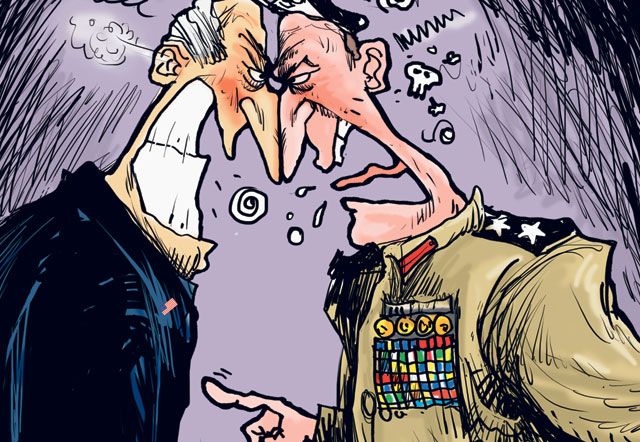Civil-military relations in the US have always been a matter of hot debate. Outside the US, however, the topic has rarely been discussed.
The widely held belief that in democracies the military salute and obey has made it almost impossible for foreign observers to see how complicated the relationship between elected officials and army officers is.
Tension in civil-military relations is perceived, hence, as a peculiar characteristic of non-democratic countries. A closer look at the issue shows a different picture, however.
Earlier this month, analysts throughout the region were surprised by the souring relationship between the Obama administration and the military establishment.
It all started when General Stanley McChrystal, commander of the US forces in Afghanistan, in an address in London described as "short-sighted" Vice President Joseph Biden's preferred strategy of using Predator and cruise-missile strikes to cut US losses in Afghanistan.
Furthermore, McChrystal leaked his assessment of the situation there to the press. He advised that the US should shift its strategy to population security and dedicate up to 40,000 additional troops to the war. Days later, he revealed that he had spoken to US President Barack Obama only once since his appointment as commander of US troops in Afghanistan.
Unsurprisingly, McChrystal's public statements offended the Obama administration, drawing bitter criticisms from senior officials. National security adviser General James Jones told CNN that it is "better for military advice to come up the chain of command".
Secretary of Defence Robert Gates reinforced this message when he said, "It is imperative that all of us taking part in these deliberations — civilians and military alike — provide our best advice to the president candidly but privately".
This was not, however, the first time that tension has risen between civilian and military officials in the US. In 2003, former Army chief of staff Eric Shinseki criticised in public the Bush administration's proposed force levels for the invasion of Iraq, describing them as too low. There are many other occasions in which relations between generals and civilians in the US government turned sour, especially in times of war.
Contrasting traditions
In fact, throughout US history, there have been two traditions in civil-military relations: the republican theory of the citizen soldier and the liberal theory of the neutral professional. These two traditions have their roots in two distinct periods of American history. The citizen soldier was a product of Civil War political thought, while the liberal tradition was born of a more progressive era that fosters "objective civilian control" over the military.
The power of the latter theory has been eroded, however, over the past decade. Recent US military missions in which the army has become increasingly involved in nation-building functions have made it almost impossible to retain the sort of "objective civilian control" over the military. The liberal vision of the military as a tool of society rather than a part of society has become increasingly flawed and indefensible.
Following the September 11 attacks on the US and the ensuing ‘war on terror', scholars, analysts and human rights advocates started to warn against total capitulation to military values. Given the nature of the ‘war on terror', the fear of militarisation in the US mounted. It is the degree to which societal institutions, values and thoughts are shaped by war.
Most people in the US accept that the ‘war on terror' is indefinite. It is a war against an ill-defined enemy, without a way to measure success or victory. It hence gives the military wider latitude in deciding the sort of action required with minimum regard to the public will represented by elected politicians.
After McChrystal's open intervention in the strategy debate on Afghanistan, many in the US urged that respect be shown to "objective civilian control", which presents the best formula to overcome the traditional tension between the military and civilians.
This formula provides that military leaders should be given wide latitude in the technical and operational realms of war in return for their complete subordination to civilian control of politics and grand strategy. This approach could have worked fairly well under different circumstances. But with a president that many in the US still think should not be in the White House, civil-military tension is likely to increase rather than decrease.
Dr Marwan Al Kabalan is a lecturer in media and international relations at Damascus University's Faculty of Political Science and Media in Syria.










